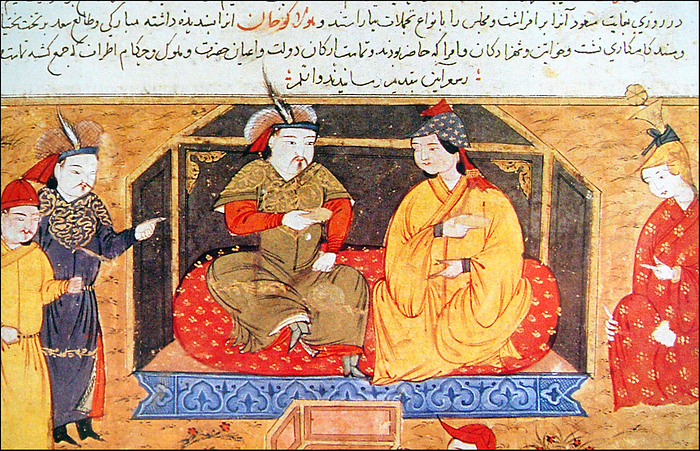
ED
Iran / Mongolia: Hulagu Khan with his Nestorian Christian wife Dokuz Khatun, from Rashid Ad-Din, 'History of the world', 14th century
Hulagu Khan, also known as Hülegü, Hulegu or Halaku (c. 1217 - 8 February 1265), was a Mongol ruler who conquered much of Southwest Asia. Tolui and the Kerait princess Sorghaghtani Beki, he was a grandson of Genghis Khan, and the brother of Arik Boke, Möngke Khan and Kublai Khan. greatly expanded the southwestern portion of the Mongol Empire, founding the Ilkhanate of Persia, a precursor to the eventual Safavid dynasty, and then the modern state of Iran. <br/><br/>the modern state of Iran.
Doquz Khatun (also spelled Dokuz Khatun) was a Turkic Kerait princess of the 13th century, who was married to the Mongol ruler Hulagu. She was known to accompany Hulagu on campaigns. At the Sack of Baghdad in 1258, the Mongols massacred tens of thousands of Doquz Khatun was a Nestorian Christian, and is often mentioned as a great benefactor of the Christian faith. When Mongol envoys were sent to Europe, they also tried to use Doquz's Christianity to advantage, by claiming that Mongol princesses such as Doquz and Soror were spared. When Mongol envoys were sent to Europe, they also tried to use Doquz's Christianity to advantage, by claiming that Mongol princesses such as Doquz and Sorghaghtani Beki were daughters of the legendary Prester John. She died in 1265, the same year as her husband.
Details
ID
174264521
Collection
License type
Editorial
Photographer
Creation date
13-11-2021
Contact Aflo for all commercial uses.

More
Top Categories
